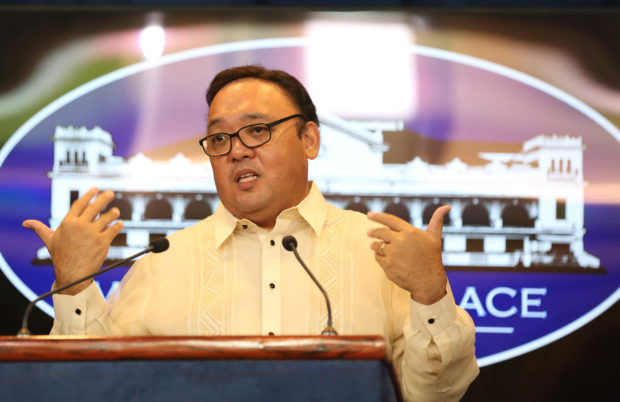
Presidential Spokesperson Harry Roque (File photo by JOAN BONDOC / Philippine Daily Inquirer)
DAVAO CITY—Even if extending the President’s term is allowed under a new Constitution, President Duterte is averse to the idea of holding on to power after his term expires in 2022, presidential spokesperson Harry Roque said here on Thursday.
Roque said Mr. Duterte was even amenable to stepping down before the expiration of his six-year term “if we can amend the 30-year-old Charter and have provisions that will minimize graft and corruption.”
He reiterated what he said was the President’s position on term extension in a press briefing here, a day after Senate President Aquilino Pimentel III said Mr. Duterte might stay on as Chief Executive after the end of his term if the form of government became federal.
Roque also allayed fears of a “no-election” (No-el) scenario as floated by Speaker Pantaleon Alvarez, saying the law mandates the holding of elections next year.
“Unless and until the Constitution is amended and ratified by the people, elections will push through in 2019,” he said.
Only senatorial elections
In a radio interview on Thursday, Alvarez said the No-el scenario he raised the day before would apply only to the 2019 senatorial elections and not to the 2022 presidential election.
“The President clearly said his term would end on or before [2022] …. [H]e can do that,” the Speaker said.
Alvarez dismissed opposition fears that Mr. Duterte’s term would be extended in the country’s transition to a federal form of government under a No-el scenario.
Transitory provisions
He said he was sure Mr. Duterte would keep his word. “I know the guy very well. He’s really tired and if only he could [end his term] tomorrow.”
Postponement of the elections will be included in the transitory provisions of a new Constitution that will be crafted by Congress sitting as a constituent assembly this year, according to Alvarez.
He said the plebiscite on the new Constitution was to be held simultaneously with barangay elections on May 14.
Though it was Pimentel who said Congress “can extend the President’s term … if [Mr. Duterte] is amenable to it,” Alvarez said in his Thursday interview raising the fear of a term extension was just a “tactic” by the opposition.
In a separate radio interview that day, Alvarez said: “The opposition says just about anything. They don’t even study if they’re looking like idiots.”
Alvarez said he raised the No-el scenario to deal with the concern that the six-year term of 12 senators should they be elected in 2019 would expire in 2025, complicating the transition to a new federal system.
Holdover until 2022
By doing away with the senatorial elections in 2019, the 11 sitting senators elected in 2013 would be retained in a holdover capacity until 2022 (one seat filled in 2013 was vacated when Sen. Alan Peter Cayetano was appointed foreign secretary).
This would allow their terms to end at the same time as the 12 senators elected in 2016.
“We should remember the senators’ terms do not expire at the same time,” Alvarez said. “So, [the expiration of all senators’ terms] could be done simultaneously in 2022 under the new structure of government.”
He said the election postponement would not affect House members and local officials who only hold three-year terms anyway.
“As far as we are concerned, for congressmen and [local governments], we can hold elections in 2019. But in my view, there’s no need for the senators,” added.
The senators who could run for reelection in 2019 are Senators Sonny Angara, Cynthia Villar, JV Ejercito, Paolo Benigno Aquino IV, Nancy Binay and Grace Poe.
Pimentel also plans to run again, although he expects to face legal questions because he occupied in 2011 the seat vacated by Sen. Juan Miguel Zubiri, who resigned as Pimentel disputed his victory in the 2007 elections.
Senators Francis Escudero, Gregorio Honasan II, Loren Legarda and Antonio Trillanes IV are no longer eligible to run in 2019 since they are serving their second consecutive terms. —REPORTS FROM FRINSTON LIM IN DAVAO CITY, AND VINCE F. NONATO AND PHILIP C. TUBEZA IN MANILA